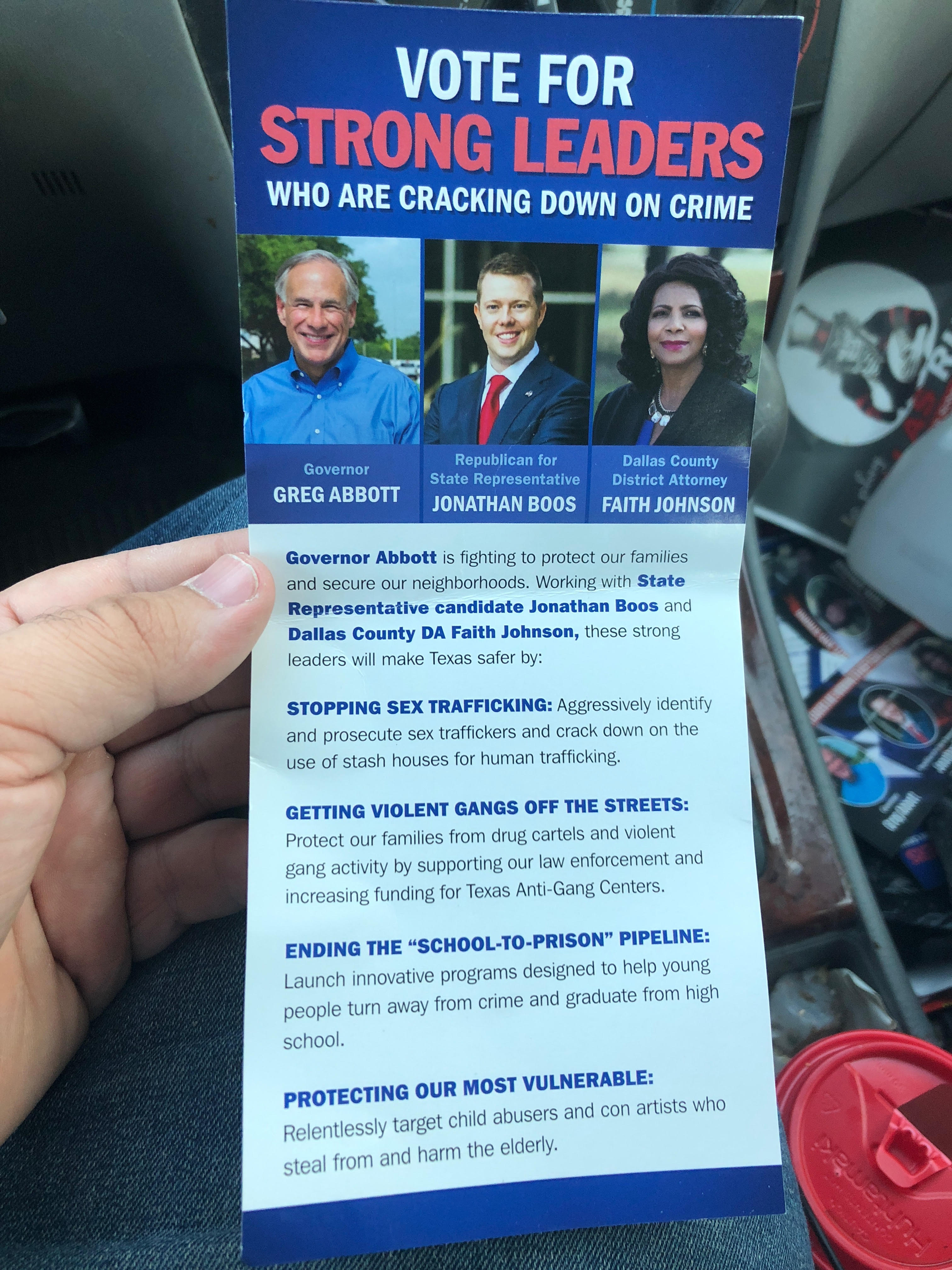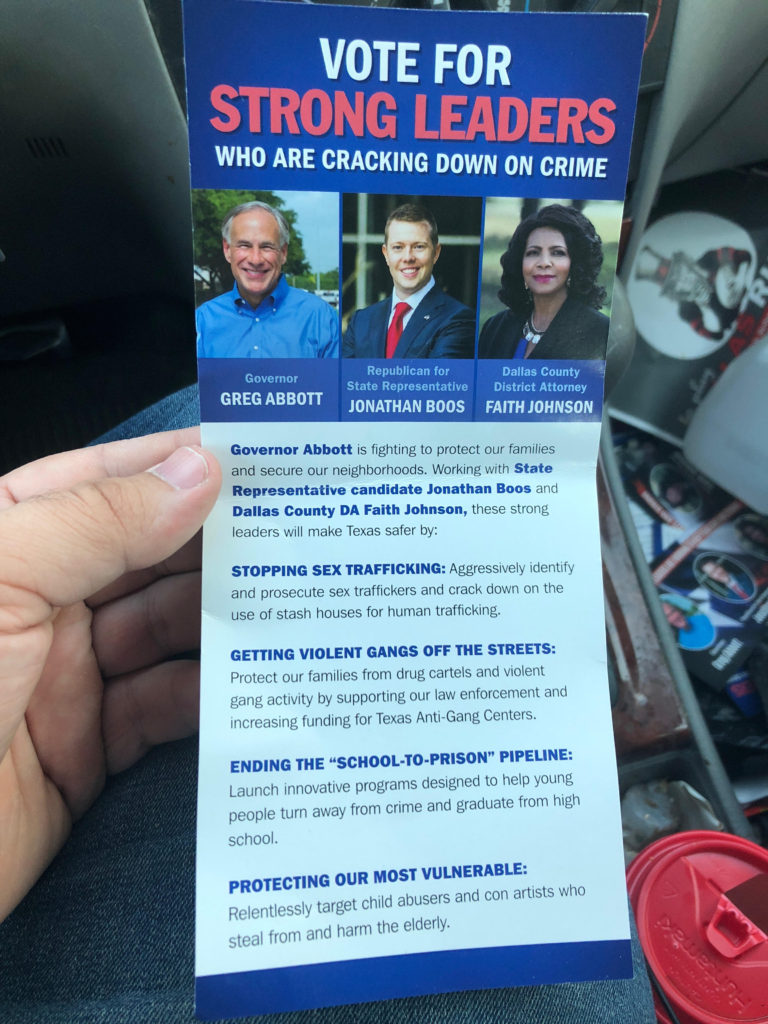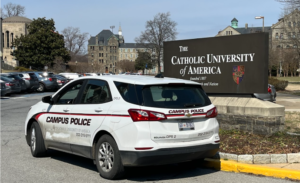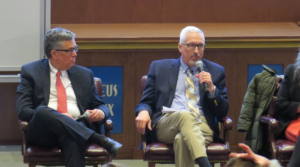Door to Door in Dallas

Courtesy of Andrew Friden
By Andrew Friden

I am a 20-year-old Republican from Upstate New York and moved to Dallas Texas six months ago. For work I am normally a pipe fitter in the construction industry but due to the recent flooding I have been looking for short term work elsewhere. I’ve always been interested in politics so I applied for a job canvassing, meaning door to door campaigning for candidates locally. I applied to the Democrat and to the Republican campaigns in the area. The Associated Republicans of Texas hired me first and are paying me a suitable $120.00 a day along with daily bonuses ranging from $50.00 to $200.00 for having more interactions with households.
I spend my days talking to people, handing out flyers that read, “Vote for strong leaders who are cracking down on crime.”
These Republican flyers I hand out are in contrast to the most recent ones the Democrats hand out that say, “When you vote it’s public record, but who you vote for is private, make your community proud and vote straight ticket Democrat.”
I grew up in upstate New York where nearly every election was a blowout victory, usually for the democratic candidates but sometimes for a Republican. However, there was never heavy campaigning. In Dallas, Texas, it is the opposite. Every race from governor to the Texas Legislature is competitive. As many of you know, the Democrats most well known candidate is Beto O’Rourke, a young U.S. Congressman from El Paso, Texas. His opposition is incumbent Senator Ted Cruz who even in Texas is known for his staunch conservative ideals and candidacy against Donald Trump for the Republican presidential nomination in 2016.
The most interesting part about this whole job has been the people I have met. I’ve primarily worked in low income, middle class neighborhoods in Garland, Texas which is about ten miles northeast of downtown Dallas. Two significant interactions I have had show me the affect that politics has on people who live in the same neighborhood.
The first happened when I came across an older woman who talked my ear off for a half hour on her porch about how great the Republicans are, how bad the Democrats are and how great of a president Trump is.
She told me, “He’s a great man religiously and doesn’t spend as much time golfing as Obama did.”
She was in the middle of this when suddenly a man driving upwards of 45 mph in a residential neighborhood slammed on his breaks and got out of the car and started yelling at me, “HEY YOU, YOU CAN’T ASK MY WIFE WHO SHE’S VOTING FOR, YOU CANT JUST WALK UP TO SOMEBODY AND ASK WHO THEY’RE VOTING FOR, YOU CAN’T DO THAT, YOU CAN’T DO THAT!”
He yelled this as he took a picture of me and attempted to report me to the authorities. Personally I worry for that man and those surrounding him because of his anger. I got out of there as soon as I could and let my supervisor know what happened. But, what bothered me the most about this was that he thought it was an offensive question for me to ask a woman about politics.
I would like to say to the readers that all I do for my job is approach a house with with my pictured Republican brochure in hand and say, “Hi I’m Andrew, do you plan on supporting any of these candidates?” Then they have three options if they even answer the door. They can 1. Decline to talk to me; 2. Respond, answer and then close the door; or 3. Converse with me about politics and the reasoning behind their vote.
A part of my job is data entry, so I ask them about if they will be voting a straight ticket for either party and issues that influence their vote. This helps the political strategists paint an idea of the election. Everything I do is well within the law and I try and be as bipartisan as possible to entertain people of both parties. Even long conversations with straight ticket Democratic voters can help paint a picture of how these Republican candidates can better help their whole district they represent, rather than just the constituents of one political party.
Not long after being yelled at by a man for doing my job that’s clearly protected under the first amendment of the constitution, I was deep into a low income neighborhood where it was common for me to come across houses that spoke no English. I was forced to take advantage of some old Spanish from high school classes and google translate. I thought I was not in a pretty neighborhood until I stumbled across a beautiful small home with its sole resident changing the oil on his Dodge Ram 2500 diesel truck. I gave the man my brief pitch and asked him about some of the motivations behind who he votes for and who he supports. Soon we were on a one hour conversation, talking about everything politics. In his past before voting, he was well versed in the candidates on both sides. He told me how he bought his house in 1982 and saw the neighborhood change in front of his eyes.
Those two instances with people really showed me how vast this American electorate is. Some people get angry at the thought of their wives discussing politics. Others passionately only vote for one party and hate the other one just as passionately. Some are are quiet and respectful but well educated on all matters and make their voting decisions off of personal knowledge and experiences rather than policies and leaflets.
That is what is beautiful about this country. You can vote for whomever you’d like to elect for office for whatever reason, whether you have a gut feeling or spend hours combing through details of individual candidates. Everybody from all sorts of backgrounds all across the country will be deciding who will run our governments across all levels and how we will be represented.






